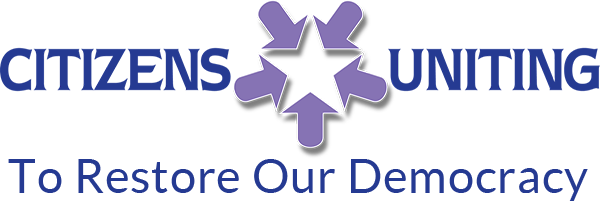
Gerald Ford Jimmy Carter David Mathews
The immediately preceding post in this series, “Playing the Long Game for Democracy,” highlighted the career of one man (David Mathews) who had, for forty years, held the Kettering Foundation on a steady course of research into a single question: “What does it take to make democracy work as it should?” Today, I’d like to examine more broadly the role that philanthropy is playing and might now more effectively play to support democracy in its hour of need.
First, to keep readers who don’t think of themselves as philanthropists from jumping ship, let me remind you that by far the greatest amount of philanthropic giving in this country is done by individuals (almost certainly including you) through every donation to a worthy cause of any kind. I will focus here primarily on “organized philanthropy” of the kind that makes grants or conducts research, but a key theme of Citizens Uniting to Restore Our Democracy is the idea of an individual democracy tithe, to which I devoted an earlier blog post. As I mentioned in the previous “long game” post, there are numerous eminently effective organizations to which we as individuals can contribute in support of the long-term work of restoring democracy. The same goes for foundations, and I would suggest that, in the current crisis of democracy, any foundation, whatever its substantive mission, might consider hedging its bets with something like a democracy tithe.

It bears noting that the long game of American conservatism to which I alluded in my last post has been crucially supported by philanthropists like the John M. Olin Foundation, the Koch and Scaife family foundations, etc. Some of the stewards of those deep pockets might now want to examine the extent to which genuine conservatism is itself dependent on viable democratic institutions and practices. Securing democracy might prove to be conservative philanthropists’ most reliable way to stave off the funeral that David Brooks has proclaimed for their faith.
But let me suggest that the same kind of bet-hedging is in order for liberally inclined philanthropy. The current sector-wide focus of the liberal philanthropic establishment on “centering equity” reflects an eminently worthy, indeed crucial guide to action. I would argue, though, that this investment of attention and resources needs to be undergirded with some serious thought about how much sustainable progress can be in terms of greater equity if the practices and culture of self-government continue to decay. Which leads back to the broader question: How powerful or focused is philanthropy’s democracy lens?
There is no prospect of answering such a question in one blog post, although I hope some readers will offer their own portions of an answer. For now, I will invite us to spend a few minutes taking a long view of philanthropy and democracy by looking way back in search of resources for the long march into democracy’s future.
As so often happens, the history is reflected in the words. We can trace the linguistic roots of both “philanthropy” and “democracy” to the soil of ancient Greece. We have preserved philo (“love”) for example, in “philosophy” — the love of sophia or wisdom. If we replace sophia with anthropos (humankind) we have philanthropy – the love of humanity.

For the Greeks, and in particular for the Athenians of the 5th and 4th centuries B.C.E., philanthropia was far more than a word – it was a worldview. It revealed itself in the breathtaking beauty of the sculptor Phidias’ renderings of the human form, in the deathless dramatic portrayals of the human condition by Aeschylus, Sophocles, and Euripides, and not least in Pericles’ ode to democracy in his funeral oration, following an early battle of the Peloponnesian War.
For Athenians, the word “democracy” meant that the people (the demos) were the rulers (kratia). Pericles’ understanding of democracy, though, reached much deeper. It rested on the same humanistic foundation as the remarkable cultural achievements of Periclean Athens: a sense of wonder at and reverence for human potential. “Our constitution is called a democracy because power is in the hands not of a minority but of the whole people,” Pericles reminded his neighbors, and then went on to equate this democratic citizenship with being robustly human, declaring “that in my opinion each single one of our citizens, in all the manifold aspects of life, is able to show himself the rightful lord and owner of his own person, and do this, moreover, with exceptional grace and exceptional versatility.”

It was this well-rounded, graceful and versatile individual who had enabled Athens to establish what we still celebrate (despite its multiple and manifest shortcomings) as the first serious experiment in democracy. If democracy inevitably fell short of its ideal, so did the citizen, but it was the deep faith in their potential that gave both rule by the people (democracy) and love of humankind (philanthropy) a lasting place in our vocabulary – and in our own aspirations. Democracy and philanthropy now once again accompany one another into a perilous passage.
Perhaps nowhere does this humanistic intersection of philanthropy and democracy command our attention more insistently than in the domain of education. The kinds of citizens that Pericles describes or that we now so desperately need in greater abundance did not then and cannot now appear miraculously on the scene. This is precisely why the most farsighted democratic theorists, including Thomas Jefferson, Horace Mann and John Dewey, have all dwelt so persistently on the fundamental importance of education to any viable system of self-government. By the same token, if individual philanthropists like you or me or institutional philanthropists of any size or variety could only make one kind of investment in the long game of restoring democracy, I would argue for putting civic education (both in the classroom and through service learning) at the top of that list.

But of course there is not just one option. Any individual’s or foundation’s democracy tithe can be devoted to a variety of democracy-restoring causes, from advancing equity to electoral reform, from promoting civic engagement to cultivating cross-ideological deliberation. I am not suggesting that any one kind of investment in the long-term healing of democracy should displace another. But I would argue that, whatever worthy cause an individual or a foundation might choose to support, growing numbers of us need to be devoting a meaningful portion of our giving to the long game of democratic renewal.
Daniel Kemmis, author of Citizens Uniting to Restore Our Democracy, is a former board member of the Kettering Foundation, the Northwest Area Foundation, and Philanthropy Northwest.



Daniel – thanks for this thoughtful piece. In broadening and deepening the understanding of the connection between philanthropy and democracy, I’m struck by a parallel from my Jewish background. While some narrow and conflate the Jewish obligation to do Tzedakah as the same as charity, it’s not that. It’s justice. Maimonides even established a hierarchy for Tzedakah, establishing the highest form as a partnership between those giving support and those needing support. Perhaps modern-day philanthropy can learn from all of this ancient advice!
I direct a private foundation, and I endorse Daniel’s proposition that foundations like ours should commit to a “democracy tithe” each year. The threats now imperiling American democracy put at risk all of the issues we funders seek to advance — racial justice, climate mitigation, healthcare, public education, civil rights, and on and on. We should tithe first to preserve our democratic institutions and practices before moving on to our favorite causes. I commend Daniel for identifying many options available for philanthropic investment to reinvigorate democracy. A special shout-out for vehicles that strengthen civic education and citizen participation in local government, which is the best crucible I know for public problem-solving and the building of social capital among people with diverse points of view.
Daniel, your thoughtful reminder that if we love humanity, we are philanthropists, was so timely. Your encouragement that we as individuals and organized philanthropy can also support democracy by being engaged with others and by supporting programs with our time, talent or treasure was particularly spot on. Programs like the Classroom Law Project work with Oregon’s schools and communities to provide experiential learning opportunities that make democracy tangible for students. As an example, Classroom Law Project engages volunteers, the judicial system and professionals along with students and their teachers in a Mock Trial experience. This year the Oregon legislature made a significant move in support of Civics and public-school education. Within a few years, all students will be required to attend at least one Civics class in order to graduate high school. The implementation of new public policy can and will be made all the easier and better due to the passionate board, staff and voluntary participants of Oregon’s Classroom Law Project. The Gordon Elwood Foundation was thrilled to support Classroom Law Project this year in southern Oregon to expand students’ understanding of democratic principles. At the same time, we were delighted to convene a virtual meeting with Classroom Law Project staff and board with philanthropists, both individuals and organized funders. It was as Mr. Trupin suggested from the wisdom of Maimonides, an intentional act to deepen partnerships among individual leaders, organizations and communities in support of youth and the future of our democracy.